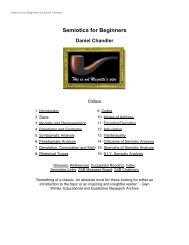Semiotics for Beginners by Daniel Chandler
Semiotics for Beginners by Daniel Chandler
Semiotics for Beginners by Daniel Chandler
You also want an ePaper? Increase the reach of your titles
YUMPU automatically turns print PDFs into web optimized ePapers that Google loves.
<strong>Semiotics</strong> <strong>for</strong> <strong>Beginners</strong> <strong>by</strong> <strong>Daniel</strong> <strong>Chandler</strong><br />
• Converse oppositions: Pairs of mutually-exclusive signifiers in a paradigm set representing categories which do<br />
not together define a complete universe of discourse (relevant ontological domain), e.g. sun/moon (Leymore).<br />
See also: Analogue oppositions, Binary oppositions<br />
• Copenhagen school: This was a structuralist and <strong>for</strong>malist group of linguists founded <strong>by</strong> the Danish linguists<br />
Louis Hjelmslev (1899-1966) and Viggo Brondal (1887-1953). Roman Jakobson (1896-1982) was associated with<br />
this group from 1939-1949. Influenced <strong>by</strong> Saussure, its most distinctive contribution was a concern with<br />
'glossematics'. Whilst Hjelmslev did accord a privileged status to language, his glossematics included both<br />
linguistics and 'non-linguistic languages' - which Hjelmslev claimed could be analysed independently of their<br />
material substance. It is a <strong>for</strong>malist approach in that it considers semiotic systems without regard <strong>for</strong> their social<br />
context. Hjelmslev's theories strongly influenced Algirdas Greimas (1917-1992), and to a lesser extent the French<br />
cultural theorist Roland Barthes (1915-1980) and the film theorist Christian Metz (1931-1993). See also: Moscow<br />
school, Paris school, Structuralism<br />
• Correspondence theory of truth: Realism depends on a correspondence theory of truth, on comparing<br />
propositions with an independent and external reality. For constructivists, reality is a construction of discourse, so<br />
all we can compare is one discourse with another. Realists insist that things exist in the external world<br />
independently of our modes of apprehending them. See also: Constructivism, Epistemology, Realism<br />
(objectivism), Reality, Relativism, epistemological<br />
• Cultural materialism: See Materialism<br />
• Cultural relativism/relativity: Cultural relativism is the view that each culture has its own worldview and that none<br />
of these can be regarded as more or less privileged or 'authentic' in its representation of 'reality' than another.<br />
Cultural worldviews are historically-situated social constructions. Cultural relativists tend also to be linguistic<br />
relativists, arguing that dominant cultural worldviews are reflected in ontologies which are built into the language<br />
of that culture. Cultural relativism is a fundamental assumption involved in Whorfianism. Anthropologists and<br />
others who study signifying practices within a culture can be seen as cultural relativists insofar as they seek to<br />
understand each culture in its own terms. However, as with epistemological relativism (with which it is closely<br />
associated), the label is often used as a criticism, being equated with extreme idealism or nihilism. See also:<br />
Constructivism, Conventionalism, Relativism, epistemological, Linguistic relativism, Social determinism,<br />
Universalism, cognitive, Whorfianism<br />
A B C D E F G H I J K L M N O P Q R S T U V W X Y Z<br />
• Decoding: The comprehension and interpretation of texts <strong>by</strong> decoders with reference to relevant codes<br />
(Jakobson). Most commentators assume that the reader actively constructs meaning rather than simply<br />
'extracting' it from the text (see Literalism). See also: Aberrant decoding, Affective fallacy, Code, Encoding,<br />
Intentional fallacy, Literalism<br />
• Deconstruction: This is a poststructuralist strategy <strong>for</strong> textual analysis which was developed <strong>by</strong> Jacques Derrida.<br />
Practitioners seek to dismantle the rhetorical structures within a text to demonstrate how key concepts within it<br />
depend on their unstated oppositional relation to absent signifiers (this involved building on the structuralist<br />
method of paradigmatic analysis). Texts do not 'mean what they say'. Contradictions can be identified within texts<br />
in such backgrounded features as footnotes, recurrent concepts or tropes, casual allusions, paradoxical phrases,<br />
discontinuities and omissions. Searching <strong>for</strong> inexplicit oppositions can reveal what is being excluded. That which<br />
has been repressed can be used as a key to an oppositional reading of the text. Poststructuralists insist that no<br />
hierarchy of meanings can ever be established and no solid underlying structural foundation can ever be located.<br />
Derrida aimed to undermine what he called the 'metaphysics of presence' in Western culture - the bias towards<br />
what we fondly assume to be 'unmediated' perception and interaction. This bias involves phonocentrism<br />
(including that of Saussure) and the myth of the 'transcendent signified'. Other deconstructionists have also<br />
exposed culturally-embedded conceptual oppositions in which the initial term is privileged, leaving 'term B'<br />
negatively 'marked'. Radical deconstruction is not simply a reversal of the valorization in an opposition but a<br />
demonstration of the instability of the opposition (since challenging the valorization alone may be taken to imply<br />
that one nevertheless accepts an ontological division along the lines of the opposition in question). Indeed, the<br />
most radical deconstruction challenges both the framework of the relevant opposition and binary frameworks in<br />
general. Deconstructionists acknowledge that their own texts are open to further deconstruction: there is no<br />
definitive reading; all texts contain contradictions, gaps and disjunctions - they undermine themselves. More<br />
broadly, deconstructive cultural criticism involves demonstrating how signifying practices construct, rather than




